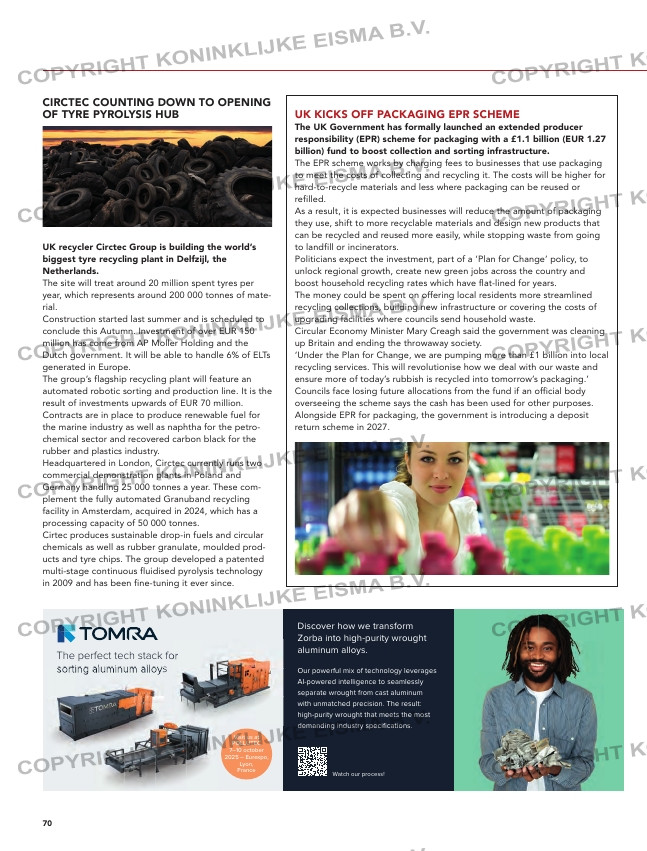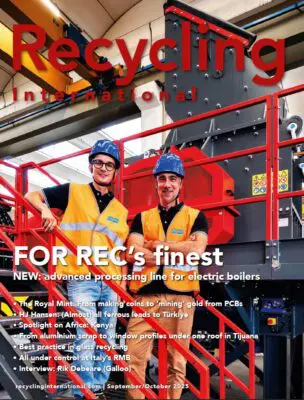Page 78 from: Recycling International September/October 2025

70
CIRCTEC COUNTING DOWN TO OPENING
OF TYRE PYROLYSIS HUB
UK recycler Circtec Group is building the world’s
biggest tyre recycling plant in Delfzijl, the
Netherlands.
The site will treat around 20 million spent tyres per
year, which represents around 200 000 tonnes of mate-
rial.
Construction started last summer and is scheduled to
conclude this Autumn. Investment of over EUR 150
million has come from AP Moller Holding and the
Dutch government. It will be able to handle 6% of ELTs
generated in Europe.
The group’s flagship recycling plant will feature an
automated robotic sorting and production line. It is the
result of investments upwards of EUR 70 million.
Contracts are in place to produce renewable fuel for
the marine industry as well as naphtha for the petro-
chemical sector and recovered carbon black for the
rubber and plastics industry.
Headquartered in London, Circtec currently runs two
commercial demonstration plants in Poland and
Germany handling 25 000 tonnes a year. These com-
plement the fully automated Granuband recycling
facility in Amsterdam, acquired in 2024, which has a
processing capacity of 50 000 tonnes.
Cirtec produces sustainable drop-in fuels and circular
chemicals as well as rubber granulate, moulded prod-
ucts and tyre chips. The group developed a patented
multi-stage continuous fluidised pyrolysis technology
in 2009 and has been fine-tuning it ever since.
UK KICKS OFF PACKAGING EPR SCHEME
The UK Government has formally launched an extended producer
responsibility (EPR) scheme for packaging with a £1.1 billion (EUR 1.27
billion) fund to boost collection and sorting infrastructure.
The EPR scheme works by charging fees to businesses that use packaging
to meet the costs of collecting and recycling it. The costs will be higher for
hard-to-recycle materials and less where packaging can be reused or
refilled.
As a result, it is expected businesses will reduce the amount of packaging
they use, shift to more recyclable materials and design new products that
can be recycled and reused more easily, while stopping waste from going
to landfill or incinerators.
Politicians expect the investment, part of a ‘Plan for Change’ policy, to
unlock regional growth, create new green jobs across the country and
boost household recycling rates which have flat-lined for years.
The money could be spent on offering local residents more streamlined
recycling collections, building new infrastructure or covering the costs of
upgrading facilities where councils send household waste.
Circular Economy Minister Mary Creagh said the government was cleaning
up Britain and ending the throwaway society.
‘Under the Plan for Change, we are pumping more than £1 billion into local
recycling services. This will revolutionise how we deal with our waste and
ensure more of today’s rubbish is recycled into tomorrow’s packaging.’
Councils face losing future allocations from the fund if an official body
overseeing the scheme says the cash has been used for other purposes.
Alongside EPR for packaging, the government is introducing a deposit
return scheme in 2027.
Discover how we transform
Zorba into high-purity wrought
aluminum alloys.
Our powerful mix of technology leverages
AI-powered intelligence to seamlessly
separate wrought from cast aluminum
with unmatched precision. The result:
high-purity wrought that meets the most
demanding industry specifications.
The perfect tech stack for
sorting aluminum alloys
Watch our process!
Visit us at
POLLUTEC
7–10 october
2025 – Eurexpo,
Lyon,
France
INT2508_Recycling International_Aluminum_205x64mm_v1.indd 1 19.08.25 17:42
CALL FOR EU ACTION TO UNLOCK PHOSPHORUS RECY-
CLING
The Swedish government has proposed changes to EU feed legislation that
would allow recycled phosphorus from sewage sludge ash to be used in
animal feed.
If adopted, this step could pave the way for large-scale phosphorus recycling
across the EU, reducing reliance on imports from Russia, experts believe.
‘Phosphorus is not just an agricultural input – it is a strategic resource,’ says Pär
Larshans, chief sustainability officer at the Ragn-Sells Group. ‘By updating out-
dated legislation, the EU can recycle this vital nutrient, safeguard our food sup-
ply and build a globally competitive circular industry within Europe.’
Phosphorus is essential for producing fertilisers and animal feed but the EU has
almost no domestic supply. Almost all phosphorus is imported from countries
such as Morocco and Russia. In the first half of 2025, EU imports of phosphorus
from Russia rose by more than 30%, despite the ongoing war in Ukraine.
‘It is deeply troubling that the EU has become more dependent on phosphorus
from Russian mines,’ says Larshans. ‘If Europe is serious about building resilience
and safeguarding its food security, we must stop relying on imported raw materi-
als and start recovering the phosphorus we already have in our wastewater.’
Ragn-Sells’ innovation company EasyMining has developed Ash2Phos, a pat-
ented technology that is claimed to recover more than 90% of the phosphorus
in sewage sludge ash, and refined it into ‘a high-purity’ recycled product. Two
full-scale plants are under construction – in Helsingborg, Sweden, and
Schkopau, Germany – ‘showing that large-scale circular recovery is technically
and economically viable,’ the company argues.
68-69-70-71-72_trendsupdatesiiadvert.indd 70 09-09-2025 15:38



